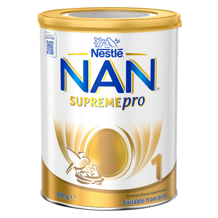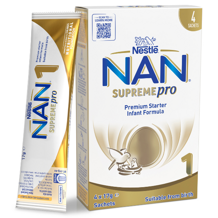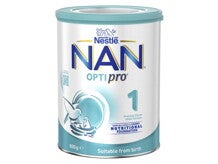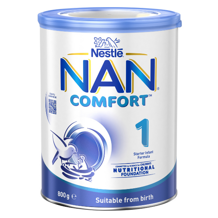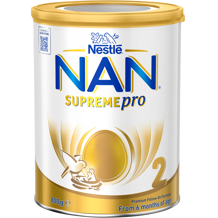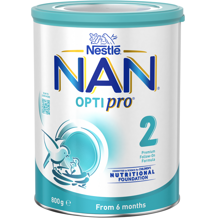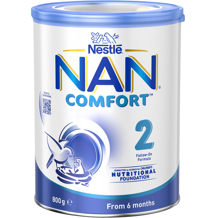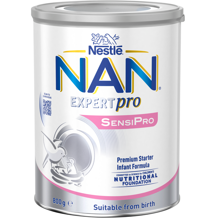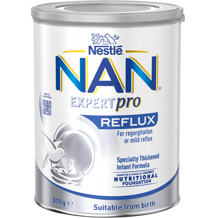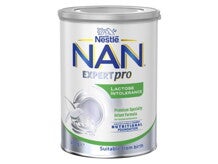
NAN Infant & Baby Formula
At Nestlé, we understand that feeding your baby can be a journey filled with questions and choices. For families using infant formula, confidence in the nutrition you provide is essential at every stage of your baby's development. We recognise that while breast milk is the best source of nutrition, every family’s feeding journey is unique. Always speak to your healthcare professional for personalised advice.
With over 155 years of expertise in nutritional science, our NAN baby formulas are meticulously crafted to meet the specific needs of infants from birth to 12 months. Our formulations are grounded in the latest scientific research, ensuring that each baby formula supports your baby’s evolving nutritional needs. We prioritise high-quality ingredients, sourced with care, to create premium infant formulas that parents can trust.
Our state-of-the-art Nestle manufacturing and research facilities adhere to the highest safety and quality standards. Whether you’re seeking a newborn formula, transitioning to a follow-on formula, or exploring your options, Nestlé’s trusted baby formula brand is committed to providing you with premium, science-based nutrition at every stage.
Our Range of Baby Formulas: From Newborn to 12 months
From those first feeds to the big growth milestones in year one, NAN Infant Formulas are tailored to support your baby’s evolving nutritional needs. Each baby formula in our range is backed by years of research and designed to support your family’s feeding choices.
Stage 1 & 2 Baby Formula
Stage 1 and 2 NAN baby formulas are specially designed to support your baby’s nutritional needs during their important first year. Stage 1 newborn formula is suitable from birth and ensures that formula-fed babies receive complete nutrition during the first six months. As your baby grows and begins solid foods, Stage 2 formulas for babies continue to provide tailored nutritional support alongside a varied diet.
NAN EXPERTPRO Baby Formulas
The NAN EXPERTpro range of baby formulas are scientifically developed to support the nutritional needs of infants from birth to 12 months, including specialised options that address specific health needs. As always, consult your healthcare provider for guidance on whether these infant formulas are suitable for your baby.
Need help choosing a formula for baby?
Feeding choices can feel overwhelming, especially with so many options. If you’re unsure where to start or how to navigate infant formula stages, our baby formula guide breaks it all down for you. It includes:
- What baby formula is and how it works
- Types of baby formulas

Guide to Baby Formula
Explore our guide to baby formula and learn more about the difference between newborn formula and stage 2 formula.
5 mins to read
Looking for more baby formula tips and feeding advice?
Frequently asked questions about Baby Formula
Which baby formula is best for babies?
Baby formula is the only suitable alternative to breast milk when needed. All infant formula in Australia must meet strict food regulations as set by the Food Standards Code of Australia & New Zealand. Always consult with your healthcare professional to ensure that the formula you choose meets your baby’s specific nutritional needs. Choosing the best formula for your baby depends on several factors, including age, nutritional needs and any specific dietary requirements or allergies. When choosing a baby formula, always remember that each baby is unique, and what works for one may not be suitable for another. Generally, baby formulas are categorised into various stages such as stage 1 infant formula or stage 2 follow-on formula. There are also specialised formulas for babies designed to be used under medical supervision, for infants with specific allergies or intolerances.
What is baby formula made from?
Most baby formulas are made from cow’s milk, with additional nutrients that are carefully chosen to ensure your baby receives the right nutrition depending on their age. All infant formula in Australia must meet strict food regulation guidelines as set by the Food Standards Code of Australia & New Zealand. These food standards stipulate a minimum level for nutrients and some products also contain permitted additional ingredients. For exact details on what your baby formula is made of, each tin has an ingredient list which details all the nutrients that is in that product, including any allergens. For detailed information about the role of these nutrients in your baby’s growth and development, consult a dietitian or a healthcare professional.
How much formula should I give my baby?
The amount of baby formula your little one needs depends on their age, weight, and individual appetite. It's important to follow your baby’s cues for hunger and fullness. Some babies may need more or less than what is recommended on the tin, and adjustments may be necessary based on your healthcare professional’s recommendations. Always remember to prepare baby formula according to the instructions on the label and consult with your healthcare professional for personalised advice on feeding amounts and schedules for your baby.
How to introduce formula to a baby?
Introducing baby formula to your child can be done gradually to help them adjust comfortably. Here are some steps to consider in your formula feeding journey:
- Consult your healthcare professional to discuss your baby’s nutritional needs to choose the right formula based on their age and dietary considerations such as lactose intolerance or allergies.
- observe your baby for any signs of intolerance or allergies. If you notice any symptoms, consult your healthcare professional for guidance.
- Monitor your baby’s feeding patterns and adjust the amount of baby formula, and frequency of feeding, based on their cues for hunger and fullness. Every infant formula tin will have a feeding table to use as a guide for your baby. However, every baby is different, so staying flexible and responsive to their needs will help establish a positive feeding routine.
For more tips on changing from one formula to another, see our tips on transitioning.
Which formula milk is best for newborns?
The best formula for your newborn is one that supports their early growth and works well for your baby’s unique needs. Stage 1 formulas are specifically designed for babies from birth. They’re developed to provide complete nutrition when breast milk isn’t available or if you’re combination (mixed) feeding. As your baby grows, particularly beyond 6 months, their nutritional needs evolve and they’ll require additional nourishment from solids and potentially a different formula stage.
Every baby is different, so it’s best to chat with your healthcare professional to help guide the decision that’s right for you and your baby.
How to change baby formula.
Changing formulas is sometimes needed in your baby’s feeding journey. Whether you're transitioning between formulas due to feeding concerns, allergies, or simply moving to the next stage, it helps to do it gradually. Start by alternating between the existing and new baby formula over several days, even weeks, and watch for how your baby responds. If you notice any changes in feeding or digestion, check in with your healthcare professional for support tailored to your baby.
How to wean baby off formula.
From 12 months of age, most babies are ready to be weaned off baby formula as they consume a variety of solid foods and drink water independently. Once your child turns 1 year old, toddler milk drinks can be introduced to complement a balanced diet when energy and nutrient intakes may not be adequate.
Monitor your toddler’s reactions during the transition, watching for signs of hunger. Some babies may take to the transition quickly, while others may need more time to adjust. Follow your toddler’s pace and preferences throughout the process.
What is the difference between infant and toddler formula?
Infant formula is specifically designed for babies from birth to 12 months. It is the only suitable substitute if breast milk is not available.
Toddler milk drinks are formulated for children over 1 year old. They serve as a nutritional supplement to their diet when energy and nutrient intake may not be adequate. Toddler milk drinks are not suitable for babies under 12 months and are not breast milk substitutes. The composition and labelling of toddler milk drinks are regulated under the Food Standards Code 2.9.3.

